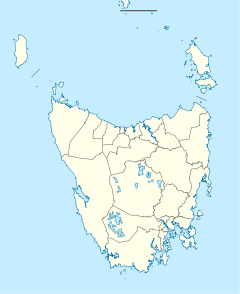Hartz Mountains National Park
| Hartz Mountains National Park | ||
|---|---|---|
|
|
||
| Location: | Tasmania , Australia | |
| Specialty: | Waterfalls, remains of the Ice Age | |
| Next city: | Huonville | |
| Surface: | 72.26 km² | |
| Founding: | 1939 | |
| Address: |
Hartz Mountains National Park via Huonville Office 22 Main Street Huonville TAS 7109 |
|
The Hartz Mountains National Park is a protected area on the Australian island of Tasmania , about 55 km southwest of Hobart . The highest point in the park is Hartz Peak (1255 m), from which there is a view of large parts of the south-western inland. The park has been a UNESCO World Heritage Site in the Tasmanian Wilderness since 1989 . The mountains are named after the Harz Mountains in Northern Germany.
Landscape image
The area itself was formed by the glaciers of the last ice ages. The vegetation of the park is diverse and includes, among other things, moist eucalyptus forest, rainforest and alpine heather areas in the summit areas.
Flora and fauna
The flora in the park is - as the explanations on the vegetation suggest - quite different. In the mixed forests of Stringybark (dominated Eucalyptus obliqua ) in the rainforest areas, the Tasmanian bill beech ( Nothofagus cunninghamii ), which belongs to the laurel-like tree Blackhearted Sassafras ( Atherosperma moschatum ) that eucryphia lucida ( Eucryphia lucida ) and the Tasmanian laurel ( Anopterus glandulosus ) .
Many of the animals in the park are nocturnal, but short-billed hedgehogs and platypus can also be encountered during the day. Furthermore, red-necked wallaby , red-bellied filander and kusus are relatively common. Among the regularly occurring bird species are the red-necked honeyeater , yellow-bellied parakeet , tasmank crow and various honey-eaters.
Recreational use
There is no official campsite in the national park, but tents are permitted under certain conditions. The facilities for day visitors are simple in nature.
The national park offers numerous opportunities to explore, including:
Nature walks (walks)
- Waratah Lookout (5 minutes there and back)
- Arve Falls (20 minutes there and back)
- Lake Osborne (40 minutes there and back)
Bushwalks (hikes)
Sturdy shoes, a warm hat and gloves are recommended as the ground is sometimes very muddy, wet or stony. Gaiters to protect against low-growing vegetation are also recommended.
- Lake Esperance (2 hours there and back)
- Hartz Pass (3.5 hours there and back)
- Hartz Peak (5 hours there and back)
The national park is mostly completely covered with snow in winter and then difficult to reach. Only very experienced hikers should do the hikes to Lake Esperance (about 90 minutes there and back) and Hartz Peak (about 5 hours there and back) at this time of year. After the snow melts in spring, the park with its waterfalls is particularly beautiful and full of life. However, difficult weather conditions can occur all year round, which is why the national park administration recommends special precautionary measures.
See also
Web links
- official site of the park (Engl.)
Individual evidence
- ↑ a b General remarks by the national park administration
- ↑ Wildlife in the park
- ↑ a b Information from the National Park Administration on possible activities

